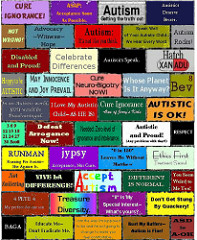I’m going to send in a couple of job applications for biology teaching positions at community colleges. With some 200 credit hours of college education, I’ve been exposed to enough teachers to know that I teach better than some of them. I’ve had a course in college teaching, over a decade of teaching continuing education (designing my own courses, content, handouts & my own photography), and have been tutoring biology for several years.
But of course I’ve not actually applied for such a job before. So here I am re-doing my teaching philosophy, checking over my resume, chewing over application letter drafts and whatnot.
Like everyone, I’m really nervous about the prospect of interviews. Unlike a lot of people, I have particular difficulties with interviews, such as the prosopagnosia. This means not recognising people from one day to the next, at least not until I’ve been around them a while. I hate it when people drag you around a building and introduce you to a gazillion people. I can barely mentally file away some vague identification characteristics for one interviewer, and even then I never know which details will prove to be the useful ones for recognising them in the future. Yes, I know … I spend an hour talking with someone, and then (aside from the name on the business card) I truly can’t remember who the hell they were the next day. It’s awful.
During the actual interview process, I’m running mental circles around the auditory processing difficulties, fidgety-scatterbrained ADHD issues, unconsciously suppressing little motor tics (I shouldn’t have to theoretically, but it’s ingrained habit under such situations), concentrating on trying to make “enough” eye contact (whatever the hell that is), concentrating on speaking clearly and avoiding stuttering, ignoring the tinnitus and joint aches (and hoping against migraine). And being nervous is bad enough without those damn menopausal hot flashes!
Of course all that detracts from the amount of energy available for composing brilliant answers. So my usual interview plan is to anticipate interview questions and then prepare and practice answers. I spend days ruminating over and practicing my short “scripts” while in the car. Fortunately, I can never remember my answers verbatim, so they don’t come off as sounding “canned”.
Unfortunately, for all I have a large vocabulary and am a well-practiced writer, I’m less able to produce clear, concise answers to unexpected questions. It’s not that I can’t think of what to say, but rather that all the details of things come to mind at once, and I can’t prioritise and sequence them easily, nor compose paragraphs and then remember them all the way through.
So … anyone out there have specific tips for teaching interviews? (I’m good on basic interview stuff like professional wardrobe.) But this is a new kind of interview situation, and I don’t know what sorts of questions are likely to be asked, nor what sorts of unspoken conventions are typical for such a process, or what committees look for.









